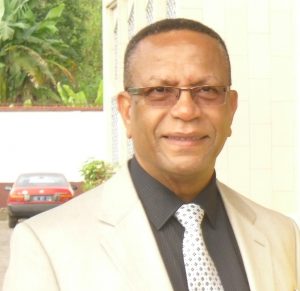The Question Hour in Parliament
 By MP Wycliffe Smith
By MP Wycliffe Smith
On Monday, January 20th the Parliament of Sint Maarten held its first Question Hour (QH) for the parliamentary year 2019-2020. This QH was the fourth held thus far since it was instituted in 2017, after Hurricane Irma, according to MP Rolando Brison, who chaired the meeting. The awkward way in which this first QH for 2020 was handled attests to the fact that it is a new phenomenon in Sint Maarten’s parliamentary system, to which MPs still need to get accustomed.
The QH in Sint Maarten is modeled after the Dutch “Vragenuurtje”, which was launched in 1970 by the Second Chamber (Dutch Parliament) and tweaked in 2011 so as to also accommodate discussion on the most current topics of the week. The way the Sint Maarten QH is structured is very similar to the rules governing the “Vragenuurtje”. Therefore it behooves the Chairman as well as the Members of Parliament to watch the “Vragenuurtje” to see how it is conducted and how it flows without parties having to remind or reprimand each other about the time and the procedures. In my opinion, the elaborate instruction given by the Chairman and the quibbling between members of Parliament could have been avoided if this was done off camera, prior to the start of the QH. Given the comments made by persons watching the Public Meeting live via Facebook the QH came across as unprofessional and hair splitting over one or two minutes of speaking or answering time.
In essence the QH is a great instrument that Parliamentarians can use to execute their supervisory function with respect to the executive branch of government. It allows a Parliamentarian to get information quickly and directly on especially a current issue pertaining to the portfolio of a Minister without having to go through the procedure of getting the support of at least two other Parliamentarians. Article 69 of the Rules of Order put it this way “every member [of parliament] pursuant the following stipulations, may ask questions to one or more ministers, also without the permission of Parliament”.
When I was not yet elected to Parliament, I submitted several proposals to the then Chairlady of Parliament, Mrs. Sarah Wescot-Williams. One such proposal pertained to a Question Hour. This is what I wrote to the Chairlady on June 13, 2017: “In order to keep Parliament and the public abreast of what is taking place at the executive level of government, I propose that, weekly, a minister is invited to share information based on questions submitted by members of parliament a week in advance. In the U.K. it is called the Prime Minister’s Question Time and in the Netherlands “het wekelijkse vragenuurtje” van de Tweede Kamer. I propose that, according to a schedule, all Ministers get the opportunity to participate in what I suggest be called the “Ministers’ Q&A”. It is good to see that this suggestions was accepted and that by the end of 2017 the “Question Hour” was instituted.
The QH is a rather new element in our Parliament and was only taken up in the Rules of Order some two years ago. Articles 69 a-f regulate the QH. It is good that these articles have been included but it is obvious that they need to be amended. In the first place the English translation should be a true reflection of the Dutch version. Furthermore, the day and the time of the QH should be included in the Rules of Order. Seeing that the QH is supposed to deal with recent and actual issues, giving a Minister three weeks to respond to current issues defeats the purpose. Hence the time period in which a Minister should come to Parliament to answer questions should be reduced to one week. The QH format should be one that offers the semblance of interaction. Having the Parliamentarian read all the questions first and subsequently having the Minister reply to all the questions comes across as very static and formal. Watching how a QH is conducted in the Netherlands, the UK, Australia and other countries, one sees a great measure on interaction between the MP and the Minister. I encourage our Parliament to learn from these other countries that by now, to a great extent, have perfected the QH in their countries.
The Question Time, as we know it today was more or less institutionalized in the UK in 1953 by by then Prime Minister, Winston Churchill. Even though the United States of America has a different system, many politicians would like to be able to call their President and State Secretaries to Congress. In May 2008, in his policy speech, Senator John McCain, Republican presidential nominee, said that if he were elected he would ask Congress to grant him the privilege of coming before both houses to take questions, and address criticism, much the same as the Prime Minister of Great Britain does regularly before the House of Commons.
The QH is a very good tool that MPs in Sint Maarten can use to ask questions of Ministers (including the Prime Minister) which they are obliged to answer. Conversely, Ministers are required to be accountable and to explain their decisions and actions with respect to their areas of ministerial responsibility. I hope that the new Parliament will take on the responsibility to tweak the relevant articles in the Rules of Order and also make use of this very unique but powerful instrument to assist them in executing their supervisory role as Parliamentarians. If used well the QH can certainly help to raise the standard in our Parliament.
Wycliffe Smith
Member of Parliament
Leader of the SMCP Faction


























